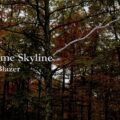Charting Relics of Lust: On Sophia Dahlin’s Natch

What if lizards were mystics and human skin had peaks that could snag? What if a callous shepherdess composed a queer love song for her crush, crooning “I invited you home to worry my mother, tra la”?
Like a lover lodged into the space between lips and a neck, Sophia Dahlin’s debut collection Natch asks these questions as it plays with the delectable—desire, prisms, the color red—and the collective, abolishing the individual in favor of shared pleasure. Dahlin’s speaker concerns herself with refractions (of self, of light, of lust), yet the poems shine most when they define the self through that which exists nearby: the neighborhood, the home, the beloved, the family. The speaker writes, toward a lover, “I wait for you, stuffed into posture.”
The speaker remains restless in her search for pleasure, which means good sex, no work, and a world without money—yet we do not witness a nihilistic teenager waiting idly for a princess to rescue her from boredom. Rather, we find a vivid and devoted lover in pursuit of a quick-witted, equally passionate match, her story told through the various psyches of lizards, shepherds, lilypads, and vegetables. Natch seems to take place in a quasi-medieval, quasi-modern world, as ballads critiquing capitalism—“wallets dry up on the dance floor”—bleed into Language poetry-infused lines—“my soul / is haired my skin has feelings.” These poems ache to be read aloud—and laughed along to in bed, a single limb reaching out for a beloved.
Dahlin moves from Diane di Prima-esque meditations on the environment and self—“who in my neighborhood smokes at night / sleeps in bushes”—to poems that shape and re-shape a single image across stanzas, mirroring Farnoush Fathi’s extended, morphing metaphors. In “Purchases,” she writes:
I mean to be mobile, I mean to rise startlingly
with your bouncing hand, no I mean to lie shudderingly
like stalks of waiting listeners and weeds
or be a brown bird gnarly in the sun
This going back on itself, re-writing, evokes T.S. Eliot—the poet considering and reconsidering reality as the poem works itself out. Dahlin’s control shines here: the “brown bird gnarly in the sun” is both shuddering and startling. As the poem hinges on a single image that ravels and unravels, Dahlin’s imagism shines and the poem completes.
Natch asks the question of how space unfolds in the distance between beloveds. These love poems introduce Catullun drama to Sapphic distance, coy and calculated in their flirtation. In “Anyone Must Sand Gingers,” the poem ends on a sort of manifesto for expansiveness: “a space must be canned / and rust bunch the hinge / anyone must burden / plain toast with some butter.” Here, the poem runs particularly Language-y, mixing parts of speech, trading verbs for nouns—“rust bunch the hinge”—to complete a thought from earlier in the poem, “what’s a map / a proposal,” where a map is not a blueprint for navigating space but an abstraction of it. A “canned” space echoes the phrase “stuffed into posture” from the poem “Switch,” further considering the relationship between an expectant lover, half of a couple, and the air closing around them. And here, as the can rusts permanently shut, the poem suggests a romance finds its resolution when tucked away, a sentiment refuted throughout the rest of the collection, where the speaker’s world is saturated with ex-girlfriends. Natch thrives in these contradictions.
In “I’m What Now,” the speaker writes, “I’ll put my nose in your lily neck / now how lucky for how long / will I be in my dwelling,” burrowing into a home in the body of the lover. “Lovely Heart” wonders how many homes we can make:
is polyamory anticapitalist
or is it she said greedy
I said sure
and generous
so generous
as to take the self apart
to lie under my lovers fucking
being like
it’s what it’s like
to be a back
Dahlin does not settle on the tidiness of finding home in a lover. This last image fixates on phase change: in relationships and in sex. Is it generous to take the self apart? For a lover? For the self? Or is that greedy, expecting too much? The lines “being like // it’s what it’s like to be a back” celebrate the beauty of succumbing to bodily need, surrendering the self to the lover. The self dissolves, replaced with a single body part devoted entirely to the beloved’s pursuit of pleasure. Yet in the context of the earlier lines, this sentiment turns sinister: is becoming “a back” a form of dissociation, or is it a fuller form of pleasure? Dahlin takes cliches—the lover as home—and makes them new: a space is canned, a body stuffed, and surrendering completely to a lover is not always noble or safe.
Dahlin is at her quickest in “Offer Honor,” a poem of rhyming couplets—an illustration of her command over the line and her capacity for surprise. The poem recalls Helen Adam’s “Counting Out Rhyme”:
But I don’t like to hear the words together
People couple to suffer
Luck is what dents the record
and Love is no survivor
Families part but roofs withstand most weather
I make my home in architecture
The rhyme scheme breaks in the second to last stanza, where luck “dents the record,” mimicking a relationship falling apart. This is one of the only poems in the collection where the start of every line—save for one—is capitalized, a stylistic choice that Lucie Brock-Boido calls the “spine” of a poem. Here, the capitalized letters become the poem’s own architecture. Likewise, the roof is almost a spine of a house, a protecting and essential feature. Perhaps “architecture” in this final line refers to the foundation of a relationship, or maybe it suggests that the speaker finds safety in structures over humans. In doing so, the speaker assesses the physical home as a model for safety, and with it, a potential antidote to romantic betrayal.
If the pastoral represents a serious inquiry into the psyche of the poet through their surroundings, then the queer pastoral Dahlin crafts in Natch, to borrow from Andrea Abi-Karam, “perverts all things pastoral in embrace of queer slipperiness.” Earlier, the speaker writes, of looking out a window, “now we live on the third floor / I am trying to get blank daily.” Screens set between self and the outside (a window, a roof), thus acting as architecture, elicit self-reflection. Elsewhere, the speaker plays with seasons and weather: “I’m so hot I think I’m summer / or I think my mood is weather.” And in “(((((((((((((())))))))))))))”:
in winter pancakes
in the summer’s butter
spring in witches better
autumn’s what the summer must
Weather stands in for the tricks the mind plays when succumbing to its own obsessions while trying to mediate the frenzy of yearning, all on the precipice of a giggle, as Natch tends to be.
In poems like “Dumbshow,” “When Relinquish on a Star,” “I’m a Ninny,” and “Poem About Seedless Tomatoes Aren’t Fruit,” Dahlin’s speaker builds a medieval record of deities, mayors, shepherds, and lust, recalling Robert Glück’s New Narrative novel Margery Kempe. Just as Glück oscillates between the young mystic Margery Kempe—who many believe wrote the first autobiography in the English language—and his modern-day love for a young man, Dahlin’s speaker weds medieval and contemporary courtship. The days in these poems are long and full of abundance and play: the speaker “stay[s] awake past the cusp of the day” and “the mayor is handsomest unjacketed and shirtless.”
In the poems “Way Up Late,” a rumination on royalty and money, and “Broke Up,” a variation on the pantun, a Malaysian verse form, the speaker creates a metaphysic for the collection, a key for how to read the poems. Here, we see the primary themes of the collection—money, weight, lust, refractions of self, space—play out against one another as we learn “the bed’s not / where the love weighs” and witness an exchange between a bank and the recurring lizard. These poems suggest that as bodies (human and lizard) move and melt in love, they not only morph into one another, but create a polyamorous, anti-capitalist ideal: a day spent lounging on warm rocks, eyes swelling from the heat, as “all my lucre goes / teeter-totter on a scale.” Dahlin’s politics envision a liberatory world, countering the loneliness of capitalism with collectivism and pleasure.
Natch renders daily life juicy, appealing, worth gushing over: “the beds get antsy,” death has glam, and noses say yes. As Dahlin’s aesthetic weds the we-want-it-all politics of Bay Area poets Diane di Prima and June Jordan with the medieval sexuality of Robert Glück, she builds a new world where money dissolves into its own overwrought impulses, desire cannot be tempered, and sex reigns supreme. Natch thrives on messiness, reminding us that desire must be leaned into, and to temper this impulse, to “soften the want / is not neat.”
About Ayaz Muratoglu
Ayaz Muratoglu is a poet and essayist living in Brooklyn, NY, whose work has appeared or is forthcoming in pan-pan press and the Lavender Review.





